MPA Graduate Stories
The Master of Public Administration (MPA) program in Political Science at Idaho State University started in the mid 1970s. Since that time, hundreds of graduates have enjoyed long careers in public service. Some graduates have gone on to earn doctorates and now teach at the college and university level. Still other graduates work in the private sector and some even own their own firms. MPA graduates from Idaho State University are placed all around the country and work as planners, administrators, executive directors of non-profits, budget analysts, legislative analysts, policy analysts, educators, business owners, and many other occupations. Graduate are employed at the federal, state, local, and non-profit sectors and graduates have won prestigious Presidential Management Fellowships (from the United States Office of Personnel Management).
In 2008, the Department of Political Science collected some MPA testimonials and these have been used successfully to introduce new students to the program and its history. In 2012 and 2013, the department is collecting "MPA Graduate Stories" and including photographs of our graduates. We hope to use these stories to not only promote our program but also to help our current students network with graduates from the nearly 40 year history of the program. We started this project in the fall of 2012 and we hope to collect as many stories as possible.
Lisa Smith, MPA, 2014

I graduated with a BA in Sociology in December of 2009. Through the required course work I gained an understanding of society and how it is socially constructed. The information helped me understand how marginalized groups within society might achieve better results. I applied this knowledge as a psychosocial rehabilitation specialist for 2 years following graduation.
I chose the MPA program because I wanted to make change on a larger scale. The MPA program gave me the information I need to make change at the policy development and program creation level, rather than at the service delivery level.
My favorite classes in the MPA program were Organizational Theory and Bureaucratic Structure and Public Policy Analysis. Both classes vastly expanded my understanding of the subjects, and will be instrumental in my future successes. Program Assessment gave me the knowledge and tools necessary to ensure that my change efforts are as successful as possible. I appreciated the Capstone class because it gave me the ability to focus on my subject of interest, and explore it to a level of understanding that positions me to create or implement large scale programs.
While in the MPA program I was given an opportunity to intern at a local non-profit organization--NeighborWorks Pocatello. During this internship I was given the opportunity to apply my knowledge, interact with the community, and receive training in the field of community building and engagement. I earned valuable experience for my resume and found the work so fulfilling that I decided to pursue it in my career. Almost a year after my internship, as I approached graduation, NeighborWorks Pocatello was hiring a Community Engagement Coordinator. My MPA degree, and the experience I gained during my internship, helped me successfully land my dream job.
My advice to current and future MPA students is to use your time and coursework during the program to become an expert on an issue. Use the program to build up a supply of papers and reports that can serve as references for information, and also be submitted to potential employers as a demonstration of your knowledge and abilities. Also, find a mentor.
Lisa Smith has been hired as a Community Engagement Coordinator for NeighborWorks.
Lynn Eddleman, MPA, 2014
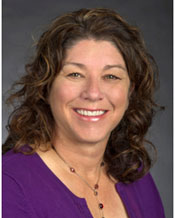
I entered the MPA program to learn new skills that would help me better manage a non-profit agency. I enjoyed our class discussions. It was interesting and beneficial to hear varied perspectives on issues of personnel administrations, community planning, legal issues and ethical concerns among others. Our classes offered an interesting mix of students, younger students who recently completed a bachelor's degree, as well as mid-career student who were returning school for further education after working for several years.
I am currently the Assistant Residency Coordinator with the ISU Family Medicine Residency Program. Eventually I would like to use my MPA to work with a non-profit organization that works to effect change in the community.
My advice to current and future MPA students is to seek out opportunities to utilize your MPA skills while still in school (internships or volunteer opportunities), opportunities you can list on a resume when seeking employment upon graduation.
Maria Husmann, MPA, 2013

My choice of MPA degree was rather serendipitous. At first, I began my Master's program in Political Science, but quickly realized that politics was too far away from everyday life of a regular citizen. It seemed to me that politics was concerned with everything but the actual problems. Political campaigns, political posturing, debates, international relations, - all of it was extremely interesting to me, but seemed too impractical and I couldn't figure out how to possibly make a difference in a political world. Instead, an MPA offered a practical degree where I could apply my knowledge directly serving the public and making their lives better a lot quicker than I otherwise would do in a political world. While pursuing a Political Science degree I tended to choose all public administration and public policy classes over traditional PoliSci classes, and eventually decided that that's what I enjoyed learning about and would love to do as a job. I quickly transferred to the MPA program and have enjoyed it ever since.
Pursuing a degree at ISU was one of the best decisions and a very special time in my life. I was amazed at the greatness of the professors who were there all the time to help you. They were (and are) highly respectful, challenging, and motivating. They strive to make your experience at ISU great and this is reflected in their classes. I miss the awesome discussions that were facilitated in the classes where I learned a tremendous share not only from the professors, but from my classmates, who in the MPA program were often professionals as well and had a lot to share from their backgrounds. I truly think getting an MPA from ISU made me dream and think bigger, strive for better life for myself and fellow citizens, be creative, and improve everything I do whether it is a job or a hobby.
Another great memory of ISU is hanging out with the friends at Gravely hall, where all of us were busy doing our work, some writing a thesis, others dissertations, but we totally made sure to have great conversations and fun in the midst of it all. Sometimes the conversations or fun would take an interesting twist only to surprise a professor who would stop by our office, that we were singing, dancing, chatting about puppies, or making videos. That was a lot of fun and I miss those times.
After my graduation I moved to Tacoma, Washington, where I accepted a job offer for a Management Analyst position for the City of Tacoma, Environmental Services Department. At first it was a temporary one year position, but this past May I was offered a permanent position with the department where I work now.
My advice to current and future MPA student is first, take the most from your studies. The MPA is a degree that will make you a well-rounded person, which in turn will tremendously help you in your career. Public Personnel, Public Policy, Organizational Theory, Program Evaluation, Ethics, and Research Methods, - are all the classes that equipped me with great skills that I utilize on a daily basis working in a public sector. Second, use any opportunity to advance yourself professionally while in ISU, whether it is interning somewhere, working for your professors, volunteering, or staying involved in University and community lives. Although college years are very short, it is a great time to learn, grow professionally, and build up your resume. You can achieve anything, but you have to work hard for it. Finally, make friends and have fun. You are exposed to so many great people in the University setting, make sure you use your opportunities to make friends and get to know people. Overall, make the best of your school experiences.
Ninette Galbraith, MPA, 2013
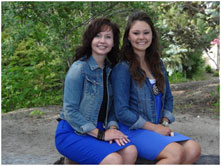
Before starting the MPA, I was actually looking to finish another Masters that I started somewhere else. When I realized that ISU did not offer the program that I needed, I looked through the catalog of programs and was intrigued by several of the classes that were offered in the MPA program. For me, it was difficult deciding which classes to take, because ISU offered so many great ones.
The teachers were wonderful and very helpful. In addition, the level of knowledge of the students helped me stretch and study harder. I felt academically stimulated almost continually and have really missed that since finishing the program. I felt like I was a decent writer when I finished undergraduate work, but the MPA program took my writing to a new level. I feel very confident in my writing now.
I got a job running a Federal Grant through the State Board of Education for my internship. I continued that after graduation, but really missed the reading and analyzing in the classroom with classmates. In January of 2014, I started teaching adjunct at BYUI in the Politcal Science department. My first class was a 300 level Introduction to Public Administration. Each one of the topics we covered, I could have spent half of a semester teaching. It was so easy to prep for because of the great training in the MPA program.
My advice to current and future MPA students is this. I would do two things while in the MPA program. 1. Take good notes. My notes have been extremely helpful for me along with the textbooks that I bought. 2. Network with your classmates and keep one another in mind if you know of a position that comes available. Soak in all of the information that you are being taught. The MPA program taught me how to think about policy and formulate solutions to policy problems. Have a great experience. You will get a good education in the ISU MPA program.
Jessie Thompson-Kelly, MPA, 2012

I graduated with my MPA on December 21, 2012. It took me longer than most students as I attended part-time, but there was a huge benefit to that...I was able to get to know some pretty amazing people in the program from multiple graduating classes.
I pursued the MPA in POLS from ISU for a myriad of reasons. First, the program certainly has direct application to my career in the public sector. Through the program I developed a better understanding of the politics of public sector employment and how to navigate it.. Second, I could select course work in the MPA that matched my interests. Because there are different areas of focus for the MPA, it offers more versatility than many other graduate programs. Third, the availability of classes fit my busy schedule. I am a wife and mother of three children. I work full time, as does my husband, and there are many days where we have to "divide and conquer" to meet our family needs and obligations. I was able to take the majority of my required classes in the evening which better fit my professional and home life. Fourth, the professors were/are fantastic; they made the classes interesting and quite frankly, fun. Also, I was able to foster great friendships with the staff and fellow students.
I have so many great memories of the MPA that it is a challenge to pick one. I was part of the first class that participated in the "Cap-stone" course as opposed to comprehensive examinations. As each of us worked through our research, we helped one another and shared our successes and frustrations. One of the students in the group arranged for a special celebratory dinner after we made it through the presentations of our research. We each were surprised to walk into the conference room of the political science department to a beautiful soft-shell crab curry and dumpling meal that still makes my mouth water. As we enjoyed our dinner, it seemed that we cemented some great friendships.
When I started the MPA program, I was already employed as a U.S. Probation Officer, and I continue in that employment today. The fact that I have the MPA makes me more marketable for future promotions in the agency, but my family always comes first, so I will hope for promotional opportunities that allow me to remain in the Pocatello area.
To current and future MPA students, I strongly recommend that you don't simply attend classes, I recommend that you actively engage in the establishment of friendships with fellow students and professors. These relationships will enrich your experience and truly bless your life. Choose to be a member of Pi Alpha Alpha and alumni groups so that you can continue to enjoy that fellowship with other MPA graduates and with the professors at the University.
1) I graduated with my MPA on December 21, 2012. It took me longer than most students as I attended part-time, but there was a huge benefit to that...I was able to get to know some pretty amazing people in the program from multiple graduating classes.
2) I pursued the MPA in POLS from ISU for a myriad of reasons. First, the program certainly has direct application to my career in the public sector. Through the program I developed a better understanding of the politics of public sector employment and how to navigate it.. Second, I could select course work in the MPA that matched my interests. Because there are different areas of focus for the MPA, it offers more versatility than many other graduate programs. Third, the availability of classes fit my busy schedule. I am a wife and mother of three children. I work full time, as does my husband, and there are many days where we have to "divide and conquer" to meet our family needs and obligations. I was able to take the majority of my required classes in the evening which better fit my professional and home life. Fourth, the professors were/are fantastic; they made the classes interesting and quite frankly, fun. Also, I was able to foster great friendships with the staff and fellow students.
3) I have so many great memories of the MPA that it is a challenge to pick one. I was part of the first class that participated in the "Cap-stone" course as opposed to comprehensive examinations. As each of us worked through our research, we helped one another and shared our successes and frustrations. One of the students in the group arranged for a special celebratory dinner after we made it through the presentations of our research. We each were surprised to walk into the conference room of the political science department to a beautiful soft-shell crab curry and dumpling meal that still makes my mouth water. As we enjoyed our dinner, it seemed that we cemented some great friendships.
4) When I started the MPA program, I was already employed as a U.S. Probation Officer, and I continue in that employment today. The fact that I have the MPA makes me more marketable for future promotions in the agency, but my family always comes first, so I will hope for promotional opportunities that allow me to remain in the Pocatello area.
5) To current and future MPA students, I strongly recommend that you don't simply attend classes, I recommend that you actively engage in the establishment of friendships with fellow students and professors. These relationships will enrich your experience and truly bless your life. Choose to be a member of Pi Alpha Alpha and alumni groups so that you can continue to enjoy that fellowship with other MPA graduates and with the professors at the University.
Yvonne Perez, MPA, 2009

I entered the M.P.A. program with a passion to serve my community and fight for social justice. The M.P.A. program opened the doors to many opportunities, including a service project with AmeriCorps, a contract with the Idaho Centers for New Directions and the distinctiveness to enter the 2015 Juris Doctorate class at the University of Idaho.
Upon graduation, I began a service project with AmeriCorps VISTA, a national service program designed specifically to fight poverty and help those in disadvantaged circumstances. There I created the foundation for a sustainable KinCare Program for relatives raising relative children.
After completing a one year service project I became the Idaho Career Pioneer Network facilitator for the Idaho Career Pioneer Network (CPN). I served in this role for two years, helping to inspire individuals to explore and pursue a full range of career options by enhancing awareness and knowledge of nontraditional careers. I focused specifically on the identification of statewide strategies at the secondary and post-secondary level for the recruitment and retention of females in science, technology, engineering, and math careers.
After completing a two year contract as the Idaho CPN Facilitator, I applied to the University of Idaho College of Law. The M.P.A. program prepared me for the rigorous curriculum, and having an M.P.A. degree gave me an advantage, not only throughout my career, but now as a J.D. student. I am confident that my M.P.A. degree and JD degree will continue to open doors to more opportunities, so that I can make a difference in the lives of those less fortunate.
Debbie Green, MPA, 2008

I can still remember the day some of my friends and colleagues encouraged me to look into the MPA program. I was working in the Health Professions College at Idaho State University, finished my undergraduate degree one year previous, and knew I wanted to further my education – in what I wasn't quite sure. After taking a course taught by Dr. Foster, "Public Administration", I was hooked. I loved everything about the class and was intrigued to learn more. Future classes brought more interest. I became fully engaged and engrained in a field that taught me so much about life, ethics, public personnel, democracy, stakeholders, power, leadership, policy making, budgeting, and most of all "a new way of learning." Memorizing was no longer my way of studying for exams. I became a "thinker, decision maker, and team player." I greatly enjoyed taking exams and going to class. I thoroughly enjoyed the class discussions and loved thinking about how the various subjects, theories and examples were interrelated and what they truly meant. Deborah Stone's books continue to be my favorite.
I am currently the "Associate Director of Scholarships" at Idaho State University. I work with undergraduate, graduate and doctoral students on a daily basis to also help them reach their educational goals/dreams. A day does not go by in which I don't make some type of decision. I work with a variety of stakeholders to come up with programs, hold committee meetings, and award scholarships in a fair and equitable manner. The MPA program has been a large reason for my success and I will always be a strong advocate of the program, MPA faculty, and philosophy of thinking. With 3 great boys, a great husband, a "rewarding" job, and a phenomenal education – life is quite good!
Linda Tigert, MPA, 2008

I entered the MPA program after completing an undergraduate degree in American Studies. I have always been a generalist who was captured by a too broad array of passions and interests. The MPA program promised to be a good fit – it provided educational structure and numerous career options while feeding a newly discovered appetite for politics and a life-long passion for learning. My goals were mostly personal; I wanted to pursue policy change and make a difference in my community and figured an extensive knowledge of how public policy worked, or didn't, was an honorable pursuit.
I appreciated the blend of theory and practice the MPA program offered. Throughout the coursework, I learned to see policymaking and public administration from a broad theoretical perspective while also developing practical tools that I rely on to this day. In the classroom, I enjoyed ample opportunity to wrestle with real problems, collaborate with other students, and become more comfortable presenting information to groups and decision-makers. I practiced ways to engage citizens in the policy process, grappled with the challenges a public administrator would likely face, and was guided to thoughtfully consider and develop my own ethical code. And along the way, the instructors were supportive, accessible, and knowledgeable.
Today, I am the planner for an Idaho county. Our planning department is very small, so I have the opportunity to wear many hats - including zoning administrator, database manager, policy analyst, records retention specialist, and copier mechanic to name a few. The MPA program provided me a solid foundation for this position, the knowledge and tools to serve the public, and, hopefully, the ability to make a difference.
Graham Garner, MPA, 2007

I had never planned to go beyond my bachelor's degree in college. While majoring in political science at Idaho State, I took some public administration courses that changed my mind. I realized that I could take the strong foundation in political science theory and transform it into practice.
Studying public administration helped me see how to become not only a good manager, but a strong leader. I learned how to develop policy, lead personnel, influence colleagues and the public, define and abide by a code of ethics, and otherwise act as a responsible public steward.
Professionally, I worked in several areas of advancement at Idaho State University as a director, including alumni relations, development, web communications, and university relations. Since I was the first-ever director of the newly created web communications office, my MPA education helped me know how to establish an office, recruit and select the right personnel, establish policies, secure resources, and work with others to gain buy-in to our goals.
After leaving Idaho State, I was the vice president for advancement at the South Dakota School of Mines and Technology and am now the associate vice president for marketing and communication at Wartburg College, a private liberal arts college in northeast Iowa. Both of these cabinet-level positions have given me the opportunity to work with other institutional leaders as peers and to counsel the president competently, in no small part because of what I learned in the MPA program.
I have recently completed my studies for a doctorate in educational leadership, with an emphasis in higher education administration. My MPA gave me a significant lead in the program, including a strong foundation in understanding the law, leadership, and working with others.
The balanced approach of theory and praxis within the MPA program has served me well through my career and additional education. I understand how to look at situations as case studies, identifying the key stakeholders and influences of power. I know how to examine situations from a variety of perspectives and play out potential solutions because of my MPA education. Most importantly, I know how to act and get results. I credit my MPA professors and curriculum with much of that.
Brad Cramer, MPA, 2007
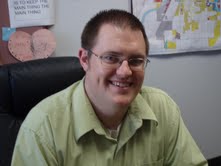
"I decided to pursue an MPA degree because I saw value in its practicality and the ability to apply the skills learned in a variety of fields. I found my first (and current) job as the Assistant Planning Director for the City of Idaho Falls just a few months after graduation. My background in planning was non-existent, but because I had an MPA degree and because I had a background in landscape design I was selected. The MPA program may not have provided me with all of the technical know-how needed to be a planner, but it gave me knowledge and skills that someone from planning school wouldn't have had.
It taught me how to analyze policy options, how to deal with the different sides of politically challenging situations, and how to sort through emotions and facts brought up during contentious public processes. The program taught me how to manage an office and think through ways to reorganize responsibilities during times of downsizing and being short-staffed. Over the past 5 years since graduating, I've learned a lot about being a planner. I feel those skills now combined with the training from the MPA program give me an advantage over others in my field that may have only focused the technical aspects of planning. I would strongly recommend the MPA program to anyone, even if at first glance it doesn't look specific to their desired field."
Lynette Sampson, MPA, 2007

I entered the MPA Program will little knowledge about the field. My Bachelor was in Justice Studies so I enjoyed my first class, Administrative Law. I started as a full time student in August 2006 and liked every class I took throughout the rest of my program. I had the opportunity to work as a Graduate Assistant for the Political Science Program, was nominated as an Outstanding Graduate Student, and took the Presidential Management Fellowship exam. I enjoyed the coursework, instructors, and other students. I liked that I was able to work on a research project with fellow students that was turned into two separate papers. I made lasting friendships along with getting a great education.
Since graduating with my MPA I have worked five years at Southeastern Idaho Community Action Agency (SEICAA) in Pocatello, Idaho. Securing my official position, Community Development Coordinator, was due in large part to the grant writing course and experience I received during the Fall semester of 2006. Since June 2007 I have worked to secure over $4 million in grant funds for my organization, have gained extensive experience working with the media and community members, and have taken lead on regional Community Based Social Marketing campaigns.
The background I have, as a result of Organizational Theory, Personnel Management, Public Policy, and coursework in the Presidency helped me to complete the Executive Skills Portfolio and pass an extensive test to receive my Certified Community Action Professional (CCAP) distinction. In August 2012 I received my certificate as a CCAP and am now one of approximately 500 individuals nationwide with this professional certification. I feel that the MPA Program was vital to helping me achieve that goal and will continue to help me as I progress in my career.
Ryan Fowler, MPA, 2006
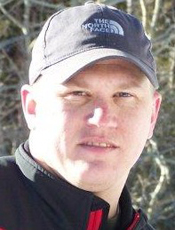
"When I entered the MPA program I didn't have a plan. I had graduated with my degree in American Studies and wanted something more before I threw myself on the mercies of the professional work force. After much research, I found the Masters in Public Administration. This program seemed to be a good mix of my personal interest and real world preparation. It turned out to be more than I expected.
The classes offered dealt with real world situations. Through the use of case studies we were able to exercise the tools that we were taught by the professors in the department. This allowed us to envision how we would use these tools in our current and future professions. I gained an immense amount of knowledge from Idaho State University's MPA program, but perhaps the most important thing I took away were lasting relationships with people invested in the future.
When I graduated from the program I was working at Portneuf Medical Center. They recognized the skills that I had obtained in my studies and promoted me to the position of Hospital Improvement Advisor in the Quality Management Department. In time, I left the hospital in Pocatello and joined Banner Health (a top 10 not-for-profit Healthcare System) as a Quality Manager in Ogallala Nebraska. I currently work and reside in Lander, Wyoming at Lander Regional Hospital. I work as the Director of Quality, Infection Control, Employee Health and Employee Education. I find my work to be very fulfilling, and use the skills I learned in the MPA program on a daily basis.
Eva Malvich, MPA, 2006
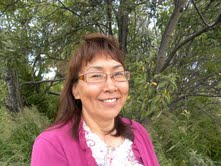
The Association of Village Council Presidents announces the hiring of Ms. Eva Malvich as the new Yupiit Piciryarait Museum Director/Curator. The museum is the regional Tribal museum located in Bethel, Alaska and serves the 56 Tribes on the Yukon-Kuskokwim Delta.
Ms. Malvich is a tribal member from the Native Village of Mekoryuk. She is the daughter of Eula David and the late Jerry David, Sr. "I've have Yup'ik and Cupik names, given to me by family. My Cupik name is Aggsirer, after my late Dad's mother. My Yup'ik name is Taurr'aq, after an elder from the community of Kwethluk who lived to be 100 and is remembered for his love of children." Eva and husband, Bryan, have three boys; Kyle Dean, Jeremy and Bryan.
Eva was raised in both Mekoryuk and Bethel. Ms. Malvich attained a Bachelor of Science Degree in Health Education with a focus on Community Health (2004), and a Master of Arts in Public Administration (2006) from Idaho State University in Pocatello, Idaho. In addition, she earned a certificate in Records Management from the National Archives and Records Administration. Prior to joining AVCP, Eva spent 20 years working for the Yukon-Kuskokwim Health Corporation. She was the Quality Assurance Manager for the Behavioral Health Department, monitoring compliance with Medicaid regulations and The Joint Commission (JCAHO) standards. Prior to that, Eva formed the Archiving Department, establishing a records retention schedule, implementing an inventory of records, and managing paper records from creation through destruction.
In her new role at AVCP as the Yupiit Piciryarait Museum Director/Curator, she is responsible for the overall management of the museum. "I am pleased to join the AVCP team and am excited to be part of the organization to help carry out AVCP's mission." As museum director, Eva's immediate goals are to inventory and prepare for an exhibit showcasing the Ludvig Evald Ost collection, made possible through a loan by the City of Marshall, and a generous grant from Donlin Gold. Ludvig Ost, or "Grandpa Ost" was a well known and well regarded Swedish missionary for the Covenant Church in Alaska.
Eva's long-term goals for the museum include researching the benefits and challenges of accreditation for the museum by the American Association of Museums. Another long-term goal is to re-design the museum's permanent display area and develop showcasing tools and materials which will guide visitors through a traditional seasonal cycle of activities for the indigenous populations of the Yukon-Kuskokwim Delta region. This work will be funded by a grant from the Alaska Humanities Forum. Ultimately, her hope is to help AVCP plan and build a Regional Repository. Eva is involved in the community by serving as a Steering Committee member for the YKHC Sobering Center and is an active member of the Bethel Roller Derby League.
Molly Duplechian, MPA, 2005

I graduated in December 2005. I began working for the Budget and Management Office in the City and County of Denver in January 2007. I began as an Associate Financial Management Analyst and have worked my way up to a Financial Management Specialist. Having been here 6 years, I have worked as the budget analyst for many different agencies in the City. I have worked as a liaison with the Parks and Department, the Denver Public Library, the Public Works Department, the Department of Safety (Police, Fire and Sheriff), City Council and several other smaller agencies.
I work with the agencies throughout the year to assist them with policy analysis, budget administration and performance management. During the annual budget process, our office works closely with the Mayor's Office to align the budget with priorities for the upcoming year. Most recently, I have been the budget representative on the City's collective bargaining negotiation team and I am now responsible for writing the budget related ordinances that flow through the City's legislative process. As a consolidated budget office, we get a bird's eye view of the City and we are involved in many different aspects of City operations. I try hard to really understand the operations of the agencies that I work with so that I can make informed policy recommendations when it comes to budgetary issues. The budget office provides me with a perfect combination of process improvement and policy analysis work. Many of the classes in my MPA program helped provide the foundation for the work that I do now on a daily basis.
David Gertsch, MPA, 2005
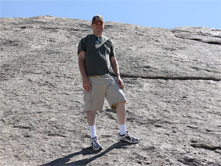
Earning my MPA provided me a foundation of skills and knowledge that has been essential to my professional work and was also the catalyst to my professional career. The MPA program led to my first professional job working as a Community Development Specialist for Partners for Prosperity, a non-profit organization. I did an internship there to fulfill the required internship credit hours for the MPA program. This led to full-time employment there shortly after my graduation. The practical knowledge I learned from my class work in the MPA program helped me write successful grants, helped me complete community research projects, and provide leadership to a regional working group.
A couple years later I was hired as the Assistant Planner for Albany County, Wyoming. As a planner I have continued to use the research skills I gained in the MPA program and my knowledge of public administration and public policy has helped me get through the often slow and intense process of creating or amending policies and regulations. I was promoted to Planning Director and am now applying many of the leadership, management, and budgeting skills that I learned in the MPA program as I lead my department and work within the County political system with all of its uncertainties.
Jeremy Peirsol, MPA, 2004
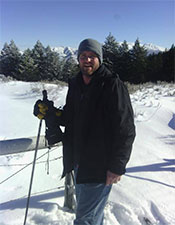
My favorite part of the program was the people and the group discussions. I genuinely feel that my professors and classmates were also my friends. I learned a great deal on how to handle difficult situations without even realizing I was learning. I loved always having people nearby who were tuned into global and local current events with poignant opinions on the subject matter. I have been working for the City of American Falls for the past 10 years. I am currently the Public Works Director and it is my job to plan future projects in coordination with our superintendents and to implement them. I also play a large role in grantwriting for our community. Examples of projects that I have been a part of are the downtown renovation (5 grants simultaneously), skate park, several Safe Routes to School sidewalk projects, 6 Willow Bay Area projects, and other smaller projects regarding Americans With Disabilities Act and Historic preservation.
Enjoy your time with your classmates as they will become your colleagues. Do what fulfills you professionally and not what earns you the most dollars. If you haven’t read the book, I would recommend Post-Cowboy Economics: Pay And Prosperity In The New American West by Richard Barrett and Thomas Michael Power.
Ben Rogers, MPA, 2004

I entered the MPA program in Fall Semester 2002. The program prepared me for a career in public administration, specifically classes like public personnel administration, organizational theory, and public finance. I benefitted from the MPA program framework, which examined the legal, managerial, and political aspects of decisions and actions in the public sector. I think back often about these lessons while working in the Federal Government.
During my last year in the MPA program, I successfully competed for the Presidential Management Fellowship (PMF) program, and chose to begin my career with the Department of Veterans Affairs at a small medical center in western Pennsylvania. Working in an administrative capacity in many areas of the hospital gave me ample opportunity to observe public administration in action. I applied many of the things I learned in the MPA program during my time there. After the 2-year fellowship ended, I was promoted within the VA and moved to a large VA healthcare system in Albuquerque, NM. While there I worked as the director of the Joint Venture, a partnership between VA and the local Air Force military treatment facility, experiencing firsthand the benefits and challenges of working in partnership with another Federal department.
I now work at the Boise VA Medical Center as the Ethics and Compliance manager, where I again apply many of the lessons I learned in the MPA program to ensure that we follow all applicable laws, rules and regulations within an ethical environment.
Maria Weeg, MPA, 2002

I honestly began my course of study at ISU as a DA student. I've always been passionate about the theoretical side of politics, the "how things ought to be" side – which is why I enrolled in graduate school in the first place. What attracted me to pursue the MPA concurrently with the DA was that the program incorporated all of the significant philosophical underpinnings of public administration while providing very real world applications.
In terms of memories, oh! There are too many to mention but when I think of my time at ISU what I remember most is the incredible cohort I had and how supportive we were of one another and how fiercely we challenged one another. I'm still in touch, in one way or another, with all of them and owe them all a great of debt of gratitude. Whether we were in class together, studying or hanging out in the Political Science library, or sparring against one another in our 101 Supreme Court simulations we were always in a state of discourse.
After graduation, I worked for the Idaho Democratic Party supporting their Get Out the Vote efforts in 2002. I am a Principal at Hilltop Public Solutions, a public affairs and strategic communications consulting firm. I run the Idaho office, one of eight nationwide.
My advice to current and future MPA students is to:
1. Keep up your SPSS skills, they'll come in handy.
2. Talk to Mark about Yellowstone and fishing.
3. Challenge assumptions, especially your own.
Christine Brower, MPA, 2002

I earned the Idaho State University Master of Public Administration degree in 2002. I am employed as Director for the Center for New Directions in the ISU College of Technology and began my employment in late 2006. Center counselors and personnel assist students and community members attain their education and employment goals.
The MPA curriculum laid an excellent foundation for my work. I selected the MPA non-profit and the state and local government track. This path has been a perfect fit for my interests. The instruction was top notch and of high value. The courses were appropriately rigorous and worthwhile in terms of time and expense. The curriculum was broad based and prepared me very well for my current position. My coursework on the case studies, on the legal issues, and understanding the requirements of work in administration continue to be pertinent in my current employment. Most of the courses were available in the evening so I could complete the degree while employed full time.
I felt respected as a student and felt comfortable in expressing my opinions in class and in my project papers. I am steadfast in my recommendation of the Master of Public Administration to interested students.
Dr. Greg Hill, MPA, 2002
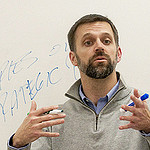
I began Idaho State's MPA program in 2000 with an unclear picture of what I wanted to do with my future. Through truly fantastic faculty, a strong cohort of students, and deeply engaging intellectual readings and assignments, I ended up in the field of academia, and am now at Boise State University as an Associate professor, Chair, and Director of the PhD program and in the Department of Public Policy and Administration. At ISU, I was able to intern with the Idaho Department of Environmental Quality and gained an important understanding of how state agencies operate. That said, open faculty doors and the constant intellectual pressure put on me by Drs. McBeth, Foster, Gabardi, and others guided my interest towards a faculty position. I was accepted and admitted to Texas A&M University's PhD in Political Science program in 2002, attended conferences from Chicago to Cooperstown, NY, to Wales to present my research on managerial succession, and graduated in 2006. I took a faculty position at Boise State University in 2005 and have been here since.
Along with traditional academic duties, I have survey and research experience in the academic, public, and private sectors. Some of my recent survey consultation includes: surveying school district superintendents in Texas; working with the Office of Performance Evaluation in developing, managing, and analyzing multiple surveys of the Department of Health and Welfare; producing and analyzing data for the Public Policy Survey.
My research interests center on public management, administration, and policy theory and immigration policy. I have written articles for State and Local Government Review, Social Science Journal, The Oxford Handbook of Public Management and the Journal of Public Administration Research and Theory and have presented papers at numerous conferences including the annual meetings of the Midwest Political Science Association and Association of Public Policy Analysis and Management. I am an avid baseball fan, and was invited to present some baseball-related research at the 16th Cooperstown Symposium on Baseball and American Culture at the National Baseball Hall of Fame in 2004. I am married and have four wonderful children.
Josh Tolman, MPA, 2000
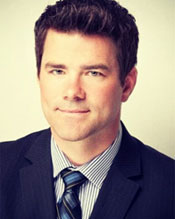
I chose the MPA because I really was excited about the mix of theory and practical application provided in the coursework. I felt strongly that in order for me to be successful in my career I needed to have a good mix of these two elements.
In terms of my memories of the program, hands down it was the discussions that our cohort engaged in both in and out of class. We had an unbelievably solid, smart, diverse group of individuals who could rationally argue many sides of an issue. Those discussions helped form many of the opinions I have to this day on management issues. Also, the professors that we had the opportunity to learn from were, in my opinion, world class. They were able to bring the course material to life, and excelled at teaching us how to take the theoretical and move it into practice-skills that I continue to use in my career today.
After graduation, I worked for the Fort Hall Housing Authority as a Homebuyer Counselor/Trainer. For the past six years I have worked at Mountain View Hospital and currently operate as the Chief Administrative Officer. Prior to this position I lived in England for just shy of three years acting as the Director of European Operations for Melaleuca, Inc.
The advice that I would give to current and future MPA students is to above all else, learn to ask the right questions. Answers are easy; those who are successful are those who learn to ask the right questions. Learn to be comfortable in ambiguity. Rarely does the world operate in black and white. Rarely are solutions linear. Being able to operate in a world of post-modern "unclarity" will pay dividends throughout your entire career. Establish meaningful relationships with your cohort. You can learn much in the coursework and the reading assignments throughout the MPA experience. You will fully realize the value of your MPA education by engaging with your cohort both inside of class and outside.
Ashley Ford, MPA, 1999

At the last minute in 1997, I decided to pursue my master's degree in Public Administration rather than my Juris Doctorate as I had always planned. I couldn't tell you why, other than I had a "pull" towards the MPA degree. After researching a number of schools, I chose Idaho State University for its practitioner-based approach. My undergraduate work had provided me with enough ivory-tower theory, and I felt it was important that a master's program provided me with the practical experience to allow me to enter the workforce easily and confidently. I was not disappointed.
During my first semester in the program, I took a Community and Regional Planning class and fell in love with the idea of pursuing a career in community and economic development. My internship with the City of Pocatello and working as an AmeriCorp VISTA Volunteer during my master's program allowed me to readily find a city planning position with the city of Boise upon graduation. I worked for the city for two years before being recruited by a private engineering firm to be their Director of Planning. Over the course of 8-years, I worked in the private land planning sector working on large, complex entitlement projects including 30,000-acre master planned communities, lifestyle centers, assisting various communities with comprehensive plan updates and representing the development community on transportation and other long-term infrastructure needs in the Boise Valley. In 2010, I transitioned into the Public Affairs arena and started the PA component for Boise-based Red Sky Public Relations. This position allowed me the ability to pursue a number of state contracts for the Department of Health and Welfare and ultimately landing the city of Meridian's urban renewal agency as a main client. In 2012, I left Red Sky and took the urban renewal district contact with me and have served as their day-to-day Administrator since October 2010. Leaving Red Sky allowed AF Public Solutions, a boutique local public affairs firm to be launched.
I feel fortunate to have come to the great state of Idaho for graduate school. Despite being far from my hometown in Missouri and away from my family in the southeastern part of the United States, Idaho is my home. I will always be indebted to the MPA faculty for being my biggest cheerleaders through graduate school. I can say with ultimate assurance that if I had attended anywhere but Idaho State University, I would not have had the opportunities project-wise, mentorship-wise and employment-wise.
My long-term goal is to be Mayor of Boise however in the immediate future, my desire is to become an Executive Director or COO of a non-profit or other worthy organization here in the Boise Valley. It is my desire to give back to the community that I love. In addition, I am pursuing the idea of applying to the new PhD program at Boise State University in Public Policy. I am involved in a number of boards that focus on women and leadership and community leadership. I am lucky to live in such a wonderful state where I can run in the foothills, ski, golf and raft with my partner Isaac and his daughter. I am blessed.
Tim Tingey, MPA, 1998

Dr. Tim Tingey has worked for fifteen years in urban renewal, economic development, redevelopment and land use planning. He is currently the director of the recently created Administrative and Development Services Department for Murray City Corporation where he oversees six divisions for the City including Community and Economic Development, Building Inspection, Geographic Information Systems, Information Technology, Recorder and Treasurer Office functions. He also serves as the Executive Director for the Redevelopment Agency of Murray and leads economic development efforts for the City. He previously worked for three years as the Director of the Community and Economic Development Department for Murray City and also worked for the City of Pocatello for eleven years. He currently serves as a board member for NeighborWorks of Salt Lake and in December 2011 was nominated and received the NeighborWorks America National Government Service Award in Washington D.C.
Tim was born in Sun Valley, Idaho and grew up in Carey, Idaho. He and his wife Gail have four children, two daughters and two sons.
Tim received his Masters of Public Administration from Idaho State University in 1998. The Masters of Public Administration (MPA) program at Idaho State University provided a solid foundation for Tim's career in local government work. He has constantly used knowledge and skills obtained from the MPA program to manage personnel, work with policy makers, facilitate group meetings, conduct research and manage public input processes. The MPA program also enhanced his desire to continue educational pursuits and in 2005 Tim completed his Doctor of Arts in Political Science at Idaho State University and taught as an adjunct faculty member at the university for three years.
Cydney Pearce - MPA, 1996
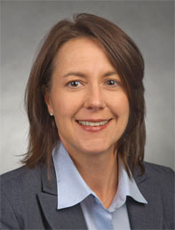
Cydney Pearce joined the ISU College of Education in August 2011 as Director of Development. A native of Helena, Arkansas, Cydney received her B.A. in political science in 1995 from Delta State University in Cleveland, Mississippi. She received her M.P.A. in public administration from Idaho State University in 1996. After graduation from ISU, she returned to Arkansas where she served as a senior aide to former U.S. Senator Blanche Lincoln focusing on economic development and legislative issues related to education and the environment.
She served in three U.S. Senate Campaigns as Deputy Campaign Manager and Financial Compliance Director. In 2002, she was named the recipient of the Jeffrey Ledbetter Memorial Award given to the state's outstanding young democrat and represented the state of Arkansas as a delegate to the Democratic National Convention in 2004. Cydney is enjoying her new role in University Advancement at Idaho State University and will complete a certificate in fundraising management from The Center on Philanthropy at Indiana University this fall.
Cydney and her husband John, a Pocatello native and current Blackfoot High School Principal, are the parents of two sons and enjoy golfing and snow skiing.
